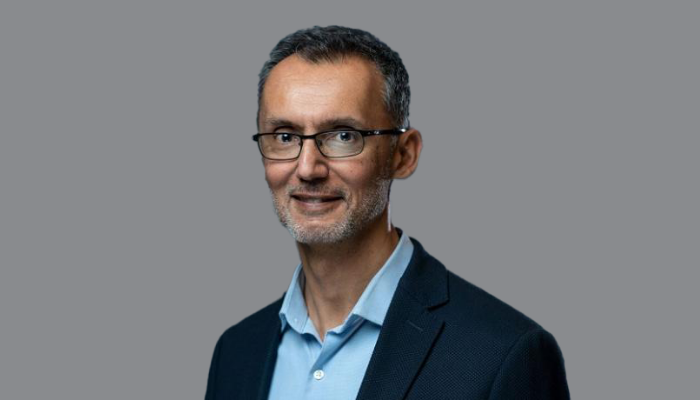
Karsan, Aly
BA, MD (Queen’s)
Academic Rank(s): Professor, Distinguished Scientist, Pathology and Laboratory Medicine, UBC | Staff Pathologist and Program Medical Director, Provincial Pathology & Laboratory Medicine, BC Cancer
Affiliation(s): BCCA/BCCRC
Research and Scholarly Interests: Blood research, Cancer, Genetics genomics proteomics and related approaches, Human Development and Aging, Molecular Pathology and Cell Biology, Professional Contributions
Clinical Interests:
Karsan Lab. We are located at the Michael Smith Genome Sciences Centre, part of the BC Cancer Research Centre.
After receiving his MD from Queen’s University in Kingston, Ontario and a rotating internship at Lion’s Gate Hospital, North Vancouver, BC, Dr. Karsan practiced medicine in rural BC and the Northwest Territories before working as a volunteer with Médecins Sans Frontières. He then completed his residency in Hematological Pathology at the University of British Columbia (UBC) followed by a Research Fellowship at the University of Washington.
Currently, Dr. Karsan is Professor of Pathology and Laboratory Medicine at UBC, and Distinguished Scientist at Canada’s Michael Smith Genome Sciences Centre at BC Cancer. Dr. Karsan has been supported by several prestigious awards over the years, including 10 years as a Clinician-Scientist awardee of the Canadian Institutes of Health Research, 10 years as a Scholar of the Michael Smith Foundation of Health Research and currently as the recipient of the John Auston BC Cancer Foundation Clinical Scientist Award.
Dr. Karsan is internationally recognized in the field of blood cancer research. His translational research lab has generated seminal work on the role of noncoding RNAs and innate immune signaling in blood cancers. He currently leads a team of six principal investigators in a Terry Fox Research Institute Program Project in acute leukemia research. He is a member of various international hematology committees including: the International Working Group for Prognosis in Myelodysplastic Syndromes (MDS), the Experimental Hematology Subcommittee of the Society for Hematopathology, and the Laboratory Assays Working Group for the Myeloid Malignancies Precision Medicine Initiative. In 2002, he co-founded the Centre for Blood Research at UBC with nine other principal investigators.
Dr. Karsan is also a recognized leader in delivering clinical genomic assays. He established the first clinically-accredited Next Generation Sequencing lab in Canada, the Centre for Clinical Genomics (CCG), which was among the first few in the world. The CCG delivers cancer genomic testing to the entire population of BC. This pioneering work in using next generation sequencing (NGS) technologies for clinical delivery has led to the development of various novel technologies for clinical genomic testing including a unique genetic barcoding system to track patient samples, development and implementation of clinical reporting software for NGS, development of a transcriptomic (RNA sequencing) test for leukemia and clinical validation of a non-invasive prenatal test (NIPT) by whole genome sequencing in partnership with the Prenatal Screening Program of BC. He has led clinical trials in leukemia and solid tumour genomics and hereditary cancer diagnostics. These innovations led to a reduction of wait times for hereditary cancer testing, reduced per test costs and have increased the breadth of genes being tested. His work has been recognized with the Health Employers Association of BC (HEABC) Gold Apple award for Innovation.
- Professor, Department of Pathology and Laboratory Medicine, University of British Columbia
- Member, Experimental Medicine, University of British Columbia
- Founding Member, Centre for Blood Research, University of British Columbia
- Member, Stem Cell Network
After receiving his MD from Queen’s University in Kingston, Ontario and a rotating internship at Lion’s Gate Hospital, North Vancouver, BC, Dr. Karsan practiced medicine in rural BC and the Northwest Territories before working as a volunteer with Médecins Sans Frontières. He then completed his residency in Hematological Pathology at the University of British Columbia (UBC) followed by a Research Fellowship at the University of Washington.
Currently, Dr. Karsan is Professor of Pathology and Laboratory Medicine at UBC, and Distinguished Scientist at Canada’s Michael Smith Genome Sciences Centre at BC Cancer. Dr. Karsan has been supported by several prestigious awards over the years, including 10 years as a Clinician-Scientist awardee of the Canadian Institutes of Health Research, 10 years as a Scholar of the Michael Smith Foundation of Health Research and currently as the recipient of the John Auston BC Cancer Foundation Clinical Scientist Award.
Academic Background
- BA, Magna Cum Laude, Queen’s University, Kingston, ON, Life Sciences
- University of St. Andrews, Scotland, Exchange scholarship (Queen’s University)
- MD, Queen’s University, Faculty of Medicine, Medicine
- Fellow of the Royal College of Physicians and Surgeons of Canada – Hematological Pathology
Awards and Recognition
Publications
Selected Publications
Research Interest
The Karsan Lab focuses on two major areas:
- Understanding the molecular basis of myeloid malignancies, in particular the preleukemic bone marrow failure conditions called myelodysplastic syndromes (MDS); and
- Determining the role of the endothelium in the development of the hematopoietic system. With respect to both areas we have been studying the role of two pathways: innate immune signaling as represented by the Toll-like receptor (TLR) pathways, and the Notch signaling pathway.
Clinical Service
Current Projects In My Lab Include
Teaching Interest
I make use of both, my clinical and research expertise in teaching. I teach Pathology and Internal Medicine residents and students clinical aspects of Hematology/Hematopathology. As well I give resident (Hematology/ Hematopathology, Oncology) seminars on tumor angiogenesis.
I teach graduate student courses using my expertise derived from my research interests in endothelial biology, apoptosis, angiogenesis and tumor biology, and stem cell differentiation. Currently much of my teaching time is spent on grad students, undergrads and high school students who are rotate through my laboratory.